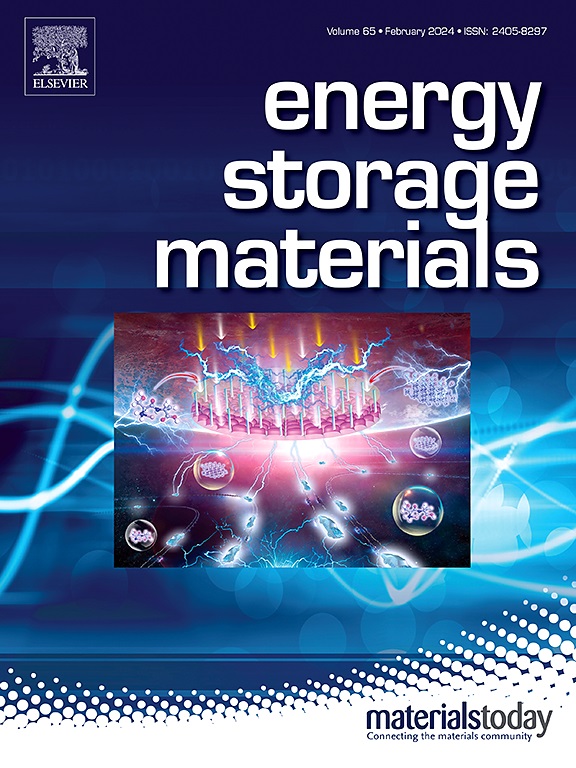Regulation of ion-dipolar and dipolar-dipolar interactions in aqueous electrolytes for supercapacitors with ultra-high cycle stability and low-temperature tolerance
IF 18.9
1区 材料科学
Q1 CHEMISTRY, PHYSICAL
引用次数: 0
Abstract
Aqueous supercapacitors are promising for sustainable and high-power energy storage, while suffer from rapid performance degradation at subzero temperatures and limited cycling stability, primarily due to low ion mobility and electrolyte freezing. This study addresses these challenges through molecular-level regulation of ion-dipolar and dipolar-dipolar interactions by introducing methanol (MeOH) as a cosolvent into a water-in-salt electrolyte (21 mol kg-1 LiTFSI/H2O), forming a diluted hybrid electrolyte. Results reveal that MeOH disrupts the original Li+-TFSI− binding via competitive ion dipolar coordination while reconstructing the hydrogen-bond network through preferential MeOH–H2O interactions. This dual regulation reduces the desolvation energy barrier for Li+ migration, suppresses parasitic interfacial reactions, and creates a low-freezing-point eutectic microenvironment. The optimized electrolyte exhibits an ultrawide liquid-phase range (−60 to 25 °C) and achieves an ionic conductivity of 2.8 mS cm−1 at −40 °C. The carbon-based supercapacitors demonstrate unprecedented cyclic durability with 94.2 % capacitance retention after nearly100,000 cycles at 2 V and maintain 84.3 % of room-temperature capacitance at −40 °C, showing superior cryo performance. This work validates the strategy of ion-dipolar and dipolar-dipolar interactions regulation for cryogenic SCs, providing fundamental insights into aqueous electrolyte engineering for extreme-condition energy storage devices.


具有超高循环稳定性和低温耐受性的超级电容器在水溶液中离子-偶极和偶极-偶极相互作用的调控
水性超级电容器有望实现可持续的高功率储能,但由于离子迁移率低和电解质冻结,在零下温度下性能会迅速下降,循环稳定性有限。本研究通过将甲醇(MeOH)作为助溶剂引入盐水电解质(21 mol kg-1 LiTFSI/H2O),形成稀释的混合电解质,通过分子水平调控离子-偶极和偶极-偶极相互作用来解决这些挑战。结果表明,MeOH通过竞争性离子偶极配位破坏了原有的Li+-TFSI -结合,同时通过MeOH - h2o的优先相互作用重建了氢键网络。这种双重调控降低了Li+迁移的脱溶能垒,抑制了寄生界面反应,创造了低凝固点共晶微环境。优化后的电解质具有超宽液相范围(- 60 ~ 25°C),在- 40°C时离子电导率为2.8 mS cm - 1。碳基超级电容器表现出前所未有的循环耐久性,在2 V下循环近10万次后,电容保持率为94.2%,在- 40°C下保持84.3%的室温电容,表现出优异的低温性能。这项工作验证了离子-偶极和偶极-偶极相互作用调控低温SCs的策略,为极端条件下储能装置的水电解质工程提供了基础见解。
本文章由计算机程序翻译,如有差异,请以英文原文为准。
求助全文
约1分钟内获得全文
求助全文
来源期刊

Energy Storage Materials
Materials Science-General Materials Science
CiteScore
33.00
自引率
5.90%
发文量
652
审稿时长
27 days
期刊介绍:
Energy Storage Materials is a global interdisciplinary journal dedicated to sharing scientific and technological advancements in materials and devices for advanced energy storage and related energy conversion, such as in metal-O2 batteries. The journal features comprehensive research articles, including full papers and short communications, as well as authoritative feature articles and reviews by leading experts in the field.
Energy Storage Materials covers a wide range of topics, including the synthesis, fabrication, structure, properties, performance, and technological applications of energy storage materials. Additionally, the journal explores strategies, policies, and developments in the field of energy storage materials and devices for sustainable energy.
Published papers are selected based on their scientific and technological significance, their ability to provide valuable new knowledge, and their relevance to the international research community.
 求助内容:
求助内容: 应助结果提醒方式:
应助结果提醒方式:


